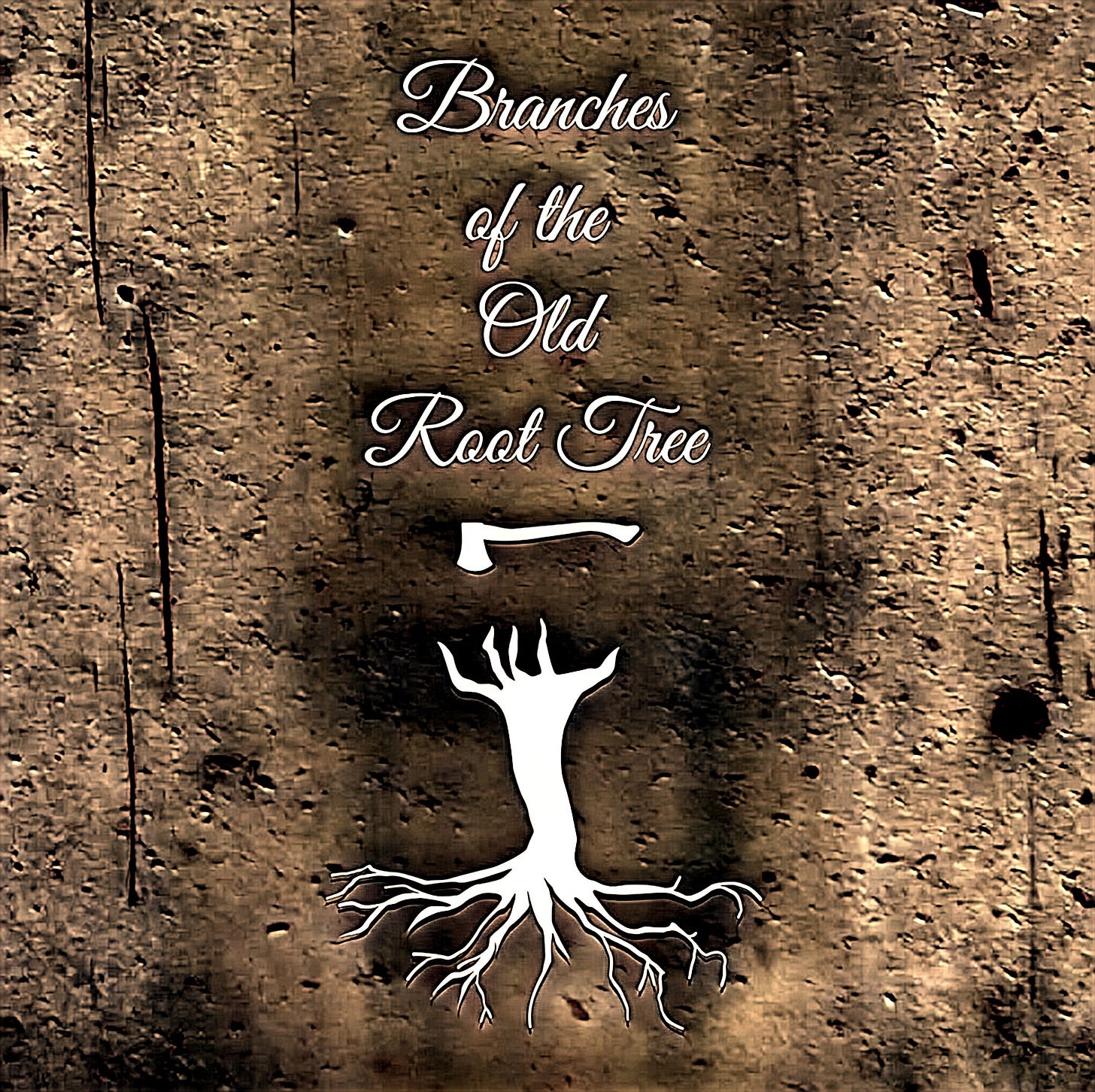First Branch, 1650
Deep in the unsettled wilderness, a wagon trundles across rock and root. The large wooden wheels are unyielding in their path, making every divit and burrow reverberate through the whole wagon. Abruptly, the mass of canvas and wood grinds to a creaking halt. Father gives the beasts a few good swats with his hands, but they won’t go on. He walks around the wagon and sees the front wheel is caught in a hole of sodden earth. “Well,” father intones, “here’ll have to do then.” But mother interjects,
“Can’t we go on just a bit farther yet?”
“Don’t see why we ought to. This plot’ll do fine. There’s plenty of trees, good clean air, and the stream we passed.” Father explains.
Familiar lines of concern and worry carve their way across mother’s face, “I don’t know, John.” she whispers, while looking around, “Something here doesn’t feel… welcoming.”
John looks at his wife and shakes his head, as two sets of gray eyes peer on from within the covered wagon bed. The gesture is one she and the children know well, and she has already given in before he speaks. “I’ll not fight with this wheel,” John retorts, “just to move a few miles farther. It’s all in your head, Mary. The wilderness never did welcome anyone in. We got to make our own place in it, and I aim to. Here’s as good as anywhere.” As he says this, he heaves on the lever to chock the wheels in place. Mary and the children watch as he walks a few feet away from the wagon, through the dense underbrush and grass, then he drops to his knees. Mary stands still beside the wagon, gazing around at the tall dark trees that encircle them.
John has both arms out wide, as if awaiting the embrace of a long-lost lover. His face is turned up to the infinite gray sky, and his eyes are closed lightly. A creaking sound comes from the wagon's ungreased joints as the two children clamber out, eager to be loose but hesitant to stray far from the wagon. The one pushes the other out onto the ground before he has time to jump out. John, still basking in the clouded sunlight, summons the three of them, “Mary. Charles, Lewis.” Charles and Lewis quietly make their way to their father and kneel beside him with heads down. Mary remains by the wagon, her attention fixed on a strange dark shadow just beyond the clearing. Lewis looks cautiously across at his brother who has the ghost of smirk on his lips, then to his father’s upturned face. “Mary.” John says more forcefully. She pulls her eyes away from the hideous tree in the distance and over to the back of John’s head.
She slowly walks over to the three of them and kneels carefully and quietly into the soft, wet mud of the clearing. After several moments of silence and closed eyes, John’s voice rings out in a sonorous incantation, not loud but not quiet either. “Holy Father,” he begins, “We are grateful for your provisions and grace. We thank you for the bountiful land we see before us.” John’s words continue, drifting across the clearing and melding with the grass and weeds. But Mary finds her eyes opening, and she dares a surreptitious look around. She can’t help but feel something out there is looking back, watching and waiting. John’s words reach a mild crescendo as he closes the benediction, “We ask all of this in your Son’s name, Amen.”
John stands and walks back to the wagon while speaking, “Come ‘ere boys. I’ve an important job for you.” As he speaks, he fishes a hatchet out of the jockey box, then turns to look them in the eyes. “Find us a tree,” he says quietly, “for the foundation of our new home. Strong and tall and straight.” Charles takes the proffered hatchet and then the two boys wander off toward the tree line. Lewis looks back over his shoulder while they walk hesitantly toward the towering trees, locking eyes with his mother for a moment, and he thinks she looks frightened. The boys nearly disappear into the thick underbrush, and John speaks to Mary while watching them, “I’ll not have you questioning my judgement in front of the boys.”
John turns toward Mary and stares her down with a quiet intensity. She stares back for a moment then meekly lowers her face and says in an obsequious voice, “I understand.”
Lewis tramps along through the weeds and thickets, trying to follow the trail Charles is making. He is watching his step and avoiding the holes and rocks when he runs into the back of Charles who has stopped. Following his gaze, they both stare into a strange clearing in the woods. There in the center of the clearing, standing crooked and alone, is the most wicked looking tree imaginable. The shape of it resembles a horrible grasping hand, reaching up from out of the earth in pain. The bark looks as though it has been scorched by fire or perhaps the very wrath of God. It’s twisted knobby fingers resemble roots more than branches, like it grew the wrong direction. The branches bear no leaves at all, and perhaps never have. Every other thing in the clearing seems to lean away from it, seeking to.
Lewis speaks first, in a whisper, “What is that…” Charles doesn’t seem to hear him. He is entranced at the sight of the tree, and he begins slowly taking steps into the clearing. Lewis whispers fearfully, “We should go back. Father said to find a tall, strong tree.”
But Charles is still moving toward the tree. Lewis gazes back but can’t see mother or father, and so he hesitantly follows Charles. Once he steps foot into the clearing, the ground feels different: colder and less like dirt, and more like ash and rot. Lewis grabs his brother's elbow and hisses out a whisper, “We should go back.”
But Charles whirls around and smacks his hand off. Lewis flinches but not from the blow Charles dealt. Rather, he saw, just for a moment, something dark in the eyes of his brother.
“Come’on, don’t be craven.” Then as Charles turns, he says, “You’re just like mother.”
Lewis hastens after him into the center of the clearing where the entirety of the horrible tree becomes visible. The roots seem to snake in and out of the ground like living things. Nothing grows around the tree and the soil is black as sin. Lewis tries once more to plead with his brother, “Please, Charles. Let’s go back.”
But instead, he walks up to the tree defiantly, as if to prove how tough he is. First, he lays a hand against it, and nothing happens. He makes a furtive glance back at Lewis, then without warning he swings the hatchet. The sharpened blade comes down hard and sinks into the ancient wood with a sickening thunk. Lewis gasps audibly, and Charles turns to face him with a mischievous look. He chides Lewis for his childish fear, then begins to climb the awful thing.
Charles places one foot onto the hatchet and uses it to get up into the crux of the tree. The moment he jumps up, the hatchet loosens from the trunk and falls amidst the writhing roots. From below, Charles looks as though he is in the clutches of some immense hell-spawn buried in the earth. Much to Lewis’s dismay, he makes a loud rooster crow.
“Come’on, Lewis. Climb up. Or are you craven?”
There is venom in the last remark and Lewis responds hastily, “I’m not a coward!”
“Yes you are. You’re just like mother.”
“No I’m not!”
Now Charles looks very self-satisfied and Lewis flushes with shame. Charles sees the moment of weakness and seizes it, biting out his words, “Then climb, craven.” Lewis stares down at the ground, then very hesitantly draws closer to the tree.
He touches the tree and it feels as though it saps away his warmth, leaving him with a chill and a bad feeling. He looks up at Charles who stands high above him with a wicked grin. Lewis glances at the wound in the trunk where the hatchet struck, and it weeps slightly, as though bleeding. When he looks back up to Charles, he has a hand held down to help him up. Lewis doesn’t immediately accept the offered hand, causing Charles to goad him on, “Come’on then, or should I call for mother?” Lewis feels his anger bubble inside and he takes Charles’ hand. Lewis is hoisted upward, with his feet clambering for purchase. It takes Charles a great deal of effort, but he pulls Lewis half up into the palm-like crux of the tree.
Charles watches Lewis struggling to pull himself up into the tree. An intense feeling of loathing overtakes Charles and he pushes Lewis just as he gets into the tree. Everything seems to unfold slowly then. Charles watches the look of surprise and fear spread across Lewis’ face as his arms flail outward for purchase, finding none. He watches Lewis fall backward out of the tree and into the air. A brief glint catches his eye as he watches Lewis land flat on his back with a dense thud. When Lewis lands, all the air is knocked out of him and he lay motionless, eyes staring up at Charles, who is laughing. Then he sees the pool of blood widening around Lewis’ head. Scared, Charles calls out, “You’re alright, come’on. Get up.” But Lewis doesn’t get up. Then his head lolls limply off to the side, exposing the hatchet that is buried in the back of his skull. Charles stares down in abject horror, barely able to comprehend the sight. The tree stands as it always has, as it always will, reaching out into the gray sky.







Yes. Awesome. That was a sick ending.
Wow! Brutal ending. Should have listened to Mary.